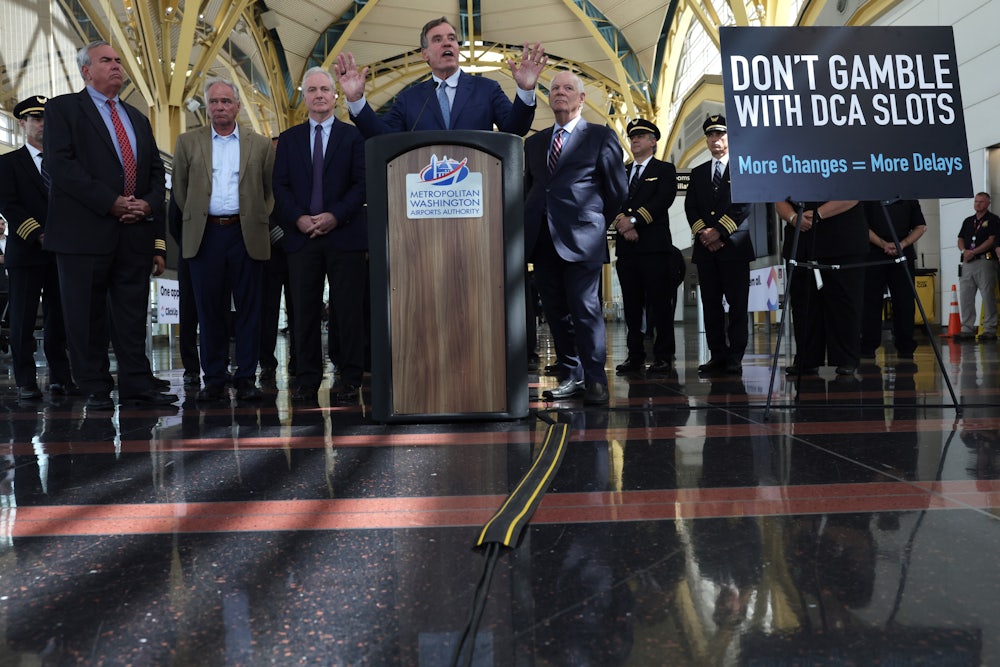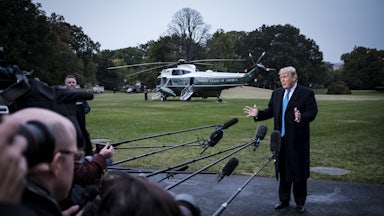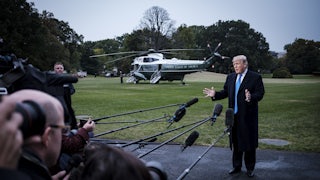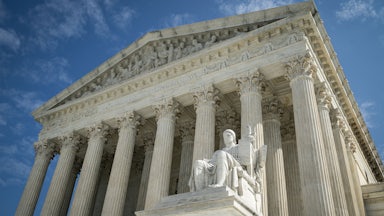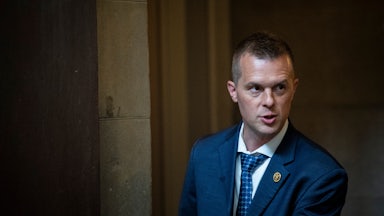For travelers embarking from Washington, D.C.’s Ronald Reagan National Airport on a day when members of Congress head to their home states and districts, it’s common to share a flight with a senator or representative. Of the three regional airports, Reagan National is the closest to the Capitol, easily accessible by the Metro (or, more likely if you’re a member of Congress, by private car).
But for decades, flights from the airport have been subject to the “DCA Perimeter Rule,” which prohibits nonstop flights to destinations more than 1,250 miles away, in order to, among other things, minimize noise pollution and congestion and emphasize Dulles International Airport’s role as a long-haul hub. Congress can and has created exemptions to the perimeter limit, allowing longer flights to and from the airport. There are currently 10 federal exemptions to that rule, affording nonstop service to cities including Los Angeles, Denver, Phoenix, Salt Lake City, and Austin.
A bipartisan coalition of lawmakers, bolstered by lobbying from some airlines, has recently pressed to add more such long-haul flights—setting up a fight that threatens a must-pass bill reauthorizing the Federal Aviation Administration ahead of a September 30 deadline. The House rejected an effort to amend the legislation to add seven new round-trip flights when it passed its version of the bill, but that doesn’t end the fight. The Senate Commerce Committee is still considering that chamber’s version of the legislation and could add further outside-the-perimeter flights.
“We’re hoping to have another bite at that apple,” said Representative Burgess Owens, a Republican from Utah who sponsored the amendment to add the flights to Reagan National. (Owens had initially supported adding 28 round-trip nonstop flights, a position shared by Senate supporters, so adding only seven new round-trip flights was touted as a compromise.) Owens argued that adding more flights would open the airport up to the “free market” by encouraging competition among airlines.
Senator Cynthia Lummis, a Republican from Wyoming, told me that adding flights is “a way to create options for people coming from the West that are affordable.” She added with a laugh: “I’ll continue to try to push for as many [flights] as we can get, recognizing that we’re outnumbered by Easterners.”
Indeed, those lawmakers and their allies are just as staunch in their opposition. Senators Tim Kaine and Mark Warner of Virginia have warned that they will not support the FAA reauthorization bill if it includes an amendment to add more nonstop flights outside of the perimeter. As Reagan National is based in northern Virginia, the two senators worry about how it would “disrupt the balance among the region’s airports and create additional delays and problems at National,” according to a June joint statement.
Kaine told me that he feels “really good” after seeing the failure of the House amendment. “I’m saying to all my colleagues, it just shows if you want to do an FAA bill, just keep extraneous stuff like that out of it,” Kaine told me. “If you put something like that in it … you run the risk of screwing up the really important parts of the bill.”
Delta Airlines, which currently has a limited presence at Reagan National, has been particularly vocal in calling for nonstop flights to be added to locations outside of the perimeter, contending that the current rule stifles competition. Given that Delta is based in Atlanta, it is no surprise that Senator Raphael Warnock, a Democrat from Georgia, is one of the biggest advocates of adding flights in the Senate.
Delta’s full-court press has included trips by airline employees to the Capitol to meet with lawmakers, hiring lobbyists, and leading a coalition of business groups called the Capital Access Alliance, which released an April study decrying the perimeter rule as “harmful to the communities and consumers served by the Washington, D.C., airports.”
In a statement on Thursday, a spokesperson for the Capital Access Alliance called the failure of Owens’s amendment “disappointing” but insisted that “this fight is far from over.” “As this debate moves to the Senate, we will continue to elevate the voices of Americans who are suffering from high ticket prices and a lack of access to their nation’s capital,” spokesperson Brian Walsh said in a statement.
But other airlines, led by United Airlines, have just as fervently opposed adding the extra flights. The Coalition to Protect America’s Regional Airports argues that the proposed changes would reduce service to destinations within the perimeter, thus harming smaller airports closer to Washington. Senator Joe Manchin of West Virginia recently came out against adding flights outside of the perimeter, contending that it would hurt his state’s airports.
“It is unacceptable to put the connectivity of countless communities to our nation’s capital at risk, simply because of the added convenience to some members of Congress who reside hundreds if not thousands of miles across the country,” Manchin scolded in a statement.
Opponents also argue that such a change would overwhelm the already strained Reagan National by increasing delays and congestion. A May FAA report responding to the Capital Access Alliance study, first reported by Punchbowl News, found that “additional flights at DCA would likely have a negative impact on operational performance and passenger experience.” (Dulles International Airport, which functions as the region’s hub for long-haul flights, also vehemently opposes adding flights to Reagan National, as it would likely divert business to the smaller airport.)
More carriers are lining up in the flight fight. On Tuesday, Southwest Airlines came out in favor of adding flights to Reagan National. A spokesperson for American Airlines, which had previously joined United in opposing the changes, said that the airline would be more open to Owens’s amendment adding seven flights, compared to the other amendments that would add 28 round-trip flights.
As flight travel has increasingly been beset by delays and disruptions in the wake of the coronavirus pandemic, reauthorizing the agency is critical for ensuring that key programs are implemented and updated. In a March blog post, the Consumer Federation of America argued that failing to pass the reauthorization bill would be “catastrophic,” as “the FAA would be encumbered with the uncertainty of short-term extensions and cast doubt on its ability to obtain the funding it needs to invest in its critical priorities.”
The House-passed bill included provisions to improve runway safety, expand hiring of air traffic controllers, authorize additional funding to improve airport infrastructure, and address airlines’ responsibilities to passengers in refunds and reimbursements. But it’s unclear when the Senate will vote on its version of the legislation. The Senate Commerce Committee’s markup of the bill stalled last month due to a dispute over changes to pilot training. These delays could hinder Congress’s ability to pass the reauthorization bill before the current legislation authorizing the FAA expires on September 30. If it cannot agree on a full reauthorization, Congress would likely pass a temporary measure while the final details are negotiated. Failure to do that could lead to a partial FAA shutdown.
Senator Ted Cruz, who supports adding flights to Reagan National, told Punchbowl News on Thursday that a markup could resume as early as next week and said the committee would vote on such an amendment.
“I am quite confident that provision will be in the Senate bill,” Cruz said.
Meanwhile, supporters of adding nonstop flights outside of the perimeter will continue to press for it to be added in the Senate version of the reauthorization bill, despite the House vote. “Now that we’ve seen how this works, and what we’re up against in terms of messaging, we’ll be much better prepared,” Owens told me about opposition to adding flights. “I’m hoping it’ll come back from the Senate, we’ll have the chance to have this conversation [again], and I think we’ll bring a lot more over at that time.”
